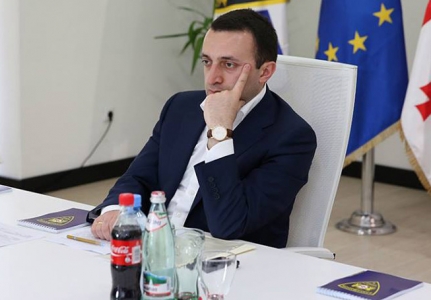
European Union Snubs Georgia on Visa Free Travel Rules, as Pro-Russian Sentiments Grow in the Country
Publication: Eurasia Daily Monitor Volume: 12 Issue: 100
By:

At the Eastern Partnership summit, held on May 21–22, in Riga, Latvia, the European Union delayed granting Georgia (along with it Ukraine) visa free travel rules for its citizens. Although Georgians were highly hopeful that their country would be granted a visa waiver for travel to the EU’s Schengen area, it was plainly clear even before the summit that their hopes would be dashed. On May 21, Germany’s Chancellor Angela Merkel, while addressing the Bundestag (lower house of the German parliament), stated that Georgia and Ukraine had “not yet [done] enough” regarding their obligations under the Visa Liberalization Action Plan (VLAP) and “a lot still [needed] to be done” (Civil Georgia, May 21).
However, the EU tried to put a positive spin on the latest rejection. Jean Claude Junker, the president of the European Commission, praised Georgia and Ukraine for the “enormous progress” they had made within the VLAP. He said he was optimistic about liberalizing the visa regimes for these two countries and stated that the European Council would make the decision during the next assessment around December 15. Donald Tusk, the president of the European Council, also expressed his optimism (Civil Georgia, May 22).
Nevertheless, it is noteworthy that the EU did not even name an approximate date when Georgia would become eligible for the visa waiver program. It also has yet to be seen how the EU’s general promises of granting a visa free regime will turn out. For now, Georgia walked out of the Eastern Partnership summit empty handed.
Even more so, Georgia, along with Moldova and Ukraine, did not receive any kind of clear perspective for future EU membership, something that these three countries were pushing for ahead of Riga summit. Instead, the summit adopted a document that simply acknowledged the European aspirations of the three partner countries. As the European Council’s President Tusk said, this was the best the summit participants could do for now, after tough and difficult discussions on the use of language in the joint end-of-summit document. Echoing a similar statement made previously by Chancellor Merkel, Tusk also quickly added that the Eastern Partnership initiative never made any explicit promise of automatic EU membership to its post-Soviet partners. He emphasized that the Eastern Partnership “is not an instrument of the EU’s enlargement policy” and, therefore, the EU should not give rise to false expectations among its Eastern partners (Civil Georgia, May 21, 22).
In spite of this, the Georgian government, specifically Georgian Prime Minister Irakli Garibashvili, called the Riga summit a success (Channel 1 TV, Imedi TV, May 22). In this, Garibashvili continues the practice of previous post-Soviet Georgian rulers, who repeatedly portrayed foreign policy failures as accomplishments in order to legitimatize their ruling regimes in the face of unpopular sentiments at home.
Georgians, however, are becoming increasingly frustrated about the constant rebuttals their country receives from the EU in particular and the West in general. The most recent nation-wide public poll, conducted by the National Democratic Institute (NDI) in April 2015, registered a considerable shift in Georgian public opinion. From November 2013 to April 2015, the support for Georgia’s EU membership declined from 85 percent to 68 percent, while opposition to it increased from 5 percent to 16 percent. In the same time period, support for Georgia’s North Atlantic Treaty Organization (NATO) membership declined from 81 percent to 65 percent, while Georgians’ opposition to it increased from 10 to 20 percent (Ndi.org, December 18, 2013, May 11, 2015).
Public disappointment with the West is progressively transforming into a significant increase of pro-Russian sentiments in the country. From November 2013 to April 2015, popular support for Georgia’s membership in the current Russian regime’s favored geopolitical project, the Eurasian Economic Union (formerly Eurasian Customs Union), increased from 11 percent to 31 percent. According to the latest NDI poll, 27 percent of Georgians do not even have an opinion about this subject, while only 41 percent oppose Georgia’s membership in the Russian-dominated regional integrationist union (Ndi.org, December 18, 2013, May 11, 2015). The scale of Georgians’ support for the Eurasian Union and, more generally, the growth of pro-Russian sentiments in the country are unprecedented in recent memory. Undoubtedly, these poll results represent the biggest shift in Georgian public opinion in recent years.
The slide in public opinion cannot be ignored. A real danger exists that such a shift may become irreversible. This trend, however, can be stopped if the EU and, more generally, the West can offer something tangible to Georgia. The Riga summit certainly did not help in this regard. After the summit, many Georgians likely feel even more disappointed, wondering once again whether their country’s goal of Western integration is attainable at all. For now, aside from the EU’s Association Agreement, which Georgia signed in June 2014, the country does not have much to show for its political and institutional integration with the West. If this trend does not change in the near future, Georgia is likely to experience serious back-tracking on its European integration–related reforms.




